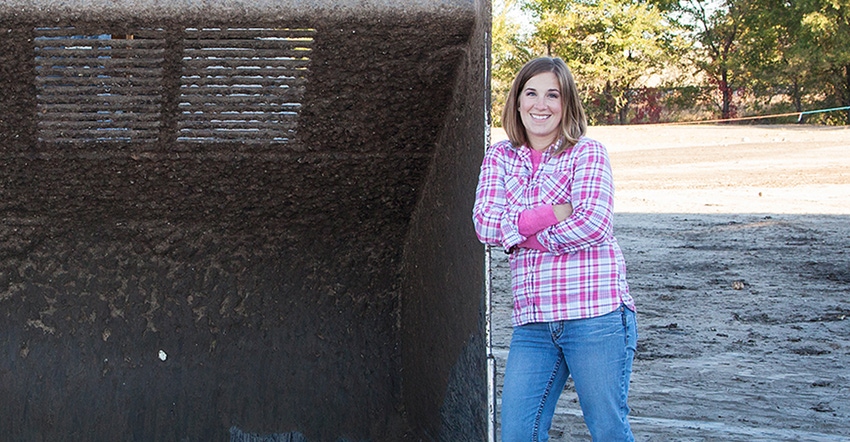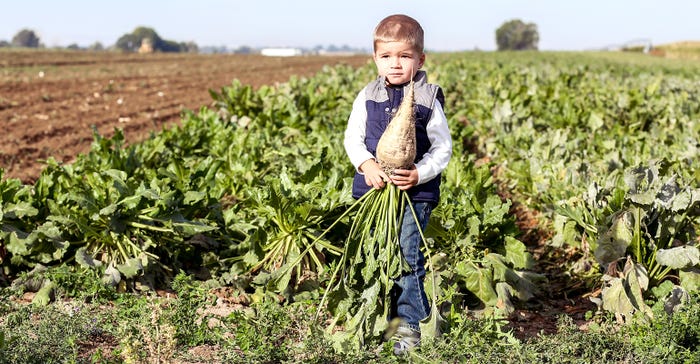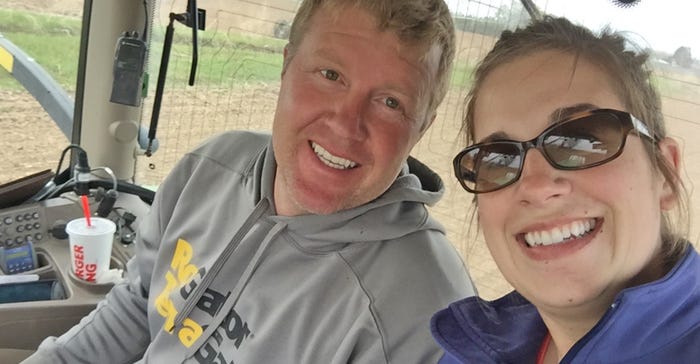
Millennial mom Liz Bingham bakes goodies for her four young boys using sugar made from GMO sugarbeets. The technology does not scare her. In fact, the Idaho young farmer spends part of her time educating fellow moms on the importance of biotechnology and sugarbeet production.
The way Bingham became an advocate of GMO sugarbeets is becoming more common. She did not grow up on a farm — Actually, Bingham is four generations removed from agriculture. However, she married a farmer, Cody Bingham.

FIT FOR FAMILY: Young Calvin Bingham stands with a sugarbeet in hand on the family farm in south-central Idaho. His mother, Liz, spends shares how the farm uses genetically modified seed that eventually becomes sugar.

The couple spent time on a corporate farm in the state of Washington, but after their second child, they returned to the family farm in south-central Idaho. There they raise corn, sugarbeets, wheat, alfalfa and carrots for seed. The family uses seed technology that includes genetically engineered traits.
Becoming an advocate
In the early years, Bingham qualified her role on the farm as “the support.” She was the lunch runner, parts getter, children’s taxi. Over time, her responsibilities grew. She was the semitruck driver and tractor operator. Finally, she became a farm industry advocate.
Two years ago, her husband threw her name out as a spokeswoman during a sugarbeet meeting. “In our meetings, we knew something had to be done as far as educating consumers on the safety of biotechnology in food production and sugar,” she says. “As an industry, we knew the main drivers are millennial moms. Who better to talk to moms than moms, grandmothers, aunts, sisters and other women?”
Bingham became part of the “A Fresh Look” campaign. Founded by 1,600 U.S. sugarbeet farming families, A Fresh Look helps answer families’ questions and concerns about how food is grown. But it is not only farmers, Bingham says; dietitians and those in academia also offer their insight on the benefits of GMO farming methods.
There is no sponsorship from agrochemical companies for A Fresh Look. “We want people to know this comes from us,” Bingham explains. “We want to engage with them, show them our farms and introduce them to our families — and let them know that this technology has changed our techniques, our methods and improved our family lifestyles.”

TIME FOR FUN: Cody and Liz Bingham spend quality time in a tractor cab during sugarbeet harvest. Liz says it allows them to talk over needs of the family, the industry and consumers.

Spreading the message
A Fresh Look approaches education from six different core principles — pesticides, health, water, food, energy and land. On the website, afreshlook.org, much of what Bingham shares falls under the land category.
There, she spends time writing about how GMO farming allows farmers to spend less time in the field by using fewer pesticides; and limiting the trips across the field, reducing soil compaction. Ultimately, she shares how GMO seed allows the beet to grow to its full potential, yielding better and with higher sugar content.
However, she understands that too much science does not sway the conversation, so she focuses on what comes naturally — being a mom and making hard food choices for her family.
Bingham knows what it is like to go into the grocery stores and be bombarded with labels and advertisements. “It is a lot of noise,” she says. “Just having a label on a product automatically makes one pause and question if it is good for you. But moms don’t have time to be an expert on everything. So, we want them to know that as far as sugar and other GM products, they don’t have to worry.”
She spends time talking with other moms any chance she can get — from the grocery store to school parties — telling them her personal story of how biotechnology fits on her sugarbeet farm and in the kitchen. After all, Bingham uses sugar derived from sugarbeets from her own family in her cooking.
“I would never tell another mother that they need to have our product just because of a bottom line,” she says. “I know it’s safe. I know how it is put together. It is grown right here on my farm.”
About the Author(s)
You May Also Like






